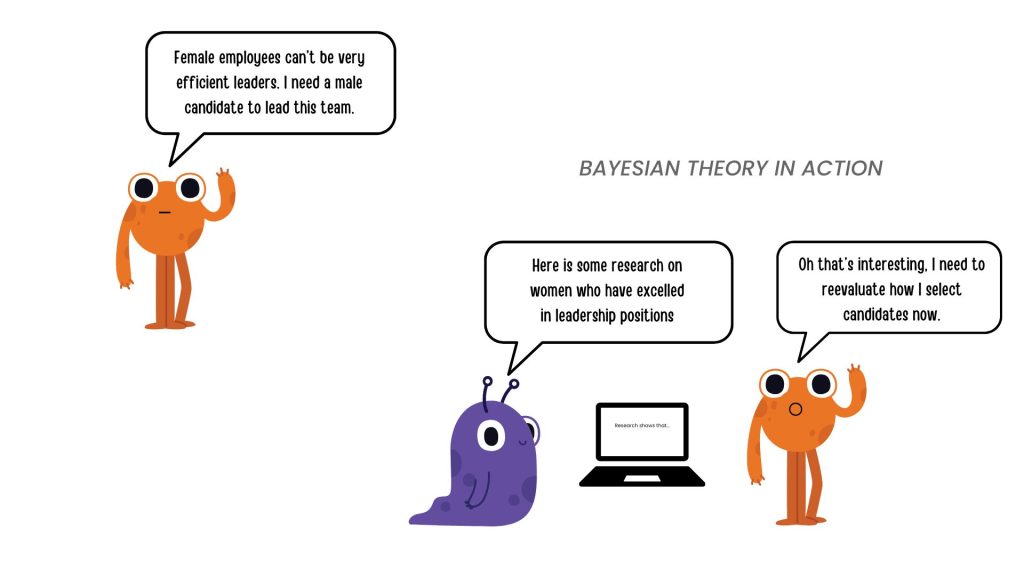Have you ever been told not to go outside with wet hair because you might catch a cold?
Most of us might not have even given it a second thought; your hair is wet and it can make you cold, it adds up. But researchers have found that feeling cold doesn’t actually make you more prone to catching a cold. In fact, colds are caused by viruses, so being chilled can trigger cold symptoms if the virus is already in your body.
So, does this new information change your perspective on the tales our mothers told us?
This is where Bayesian theory comes into play
Bayesian theory is a concept in statistics, but don’t worry, this article isn’t a stats lesson. Instead, it’s about using Bayesian theory to enhance our thinking.
Bayes’ Theorem, named after the Reverend Thomas Bayes, provides a framework for updating our existing beliefs based on new evidence. By the end of this post, you’ll be making better decisions, realizing when you’re being unreasonable, and understanding why some people still believe the Earth is flat.
Understanding Bayes’ Theorem can also teach us how stereotypes form, showing how evidence, belief reinforcement, and the challenges in changing our viewpoints interact. Stereotypes are oversimplified ideas about groups of people. They form through repeated exposure to the same messages and can be reinforced by confirmation bias, where we only notice evidence that supports our existing beliefs.
When we hold firm opinions about something, it can be daunting to consider new information or alternative viewpoints. However, rest assured, Bayesian reasoning offers a solution to this challenge.
Bayesian reasoning works by starting with an initial belief, gathering new evidence, and then updating that belief based on the latest information. This approach helps counteract confirmation bias, where people favor information confirming their preexisting beliefs while ignoring contradictory evidence.
When considering stereotypes it’s essential to consider the role of confirmation bias in this scenario. Confirmation bias is when new evidence is presented, people might selectively focus on information that reinforces their existing stereotypes while ignoring or discounting evidence that contradicts them. Therefore, overcoming stereotypes requires exposing individuals to new perspectives and cultivating an awareness of the bias to encourage more open-minded processing of information. Bayesian theory can offer a structured method to reassess thoughts rationally, potentially making mitigating the effects of confirmation bias and reducing reliance on stereotypes easier.
Take, for example, the stereotype that women are less competent in leadership roles. This stereotype can manifest in various ways, such as fewer women being promoted to management positions or their ideas being dismissed in meetings. This belief may persist because people have not been exposed to enough examples to counter this notion.
Overcoming stereotypes requires expanding our knowledge and learning. Organizations can provide concrete evidence that challenges this stereotype by actively showcasing case studies of women who have excelled in leadership positions, inviting female leaders to speak at company events, or sharing research demonstrating women’s effectiveness in leadership roles. Learning about the obstacles women have overcome and their significant accomplishments can shift perceptions and create a more equitable view of their capabilities.

Encouraging continuous learning and open dialogue can create an environment where stereotypes are regularly questioned and reevaluated. When employees are encouraged to engage with diverse perspectives and have opportunities to learn about different cultures and experiences, they become more open-minded and less likely to rely on simplistic, biased assumptions.
Spencer Greenberg, a mathematician, explains that when presented with new evidence if you previously believed something had a 1 in 1000 chance of being true, you might now think it has a 1 in 100 chance.
“You still think it’s unlikely,” says Greenberg, “just less unlikely.”
As for those who still believe the Earth is flat, maybe they haven’t come across compelling enough evidence to believe otherwise.
Bayesian theory is not just for statisticians. It is a powerful instrument for anyone looking to improve their critical thinking skills. By updating our beliefs in light of new evidence, we can make better decisions and challenge the stereotypes that shape our world.
So next time your mother tells you not to go out with wet hair, remember to apply a speck of Bayesian reasoning and see where it takes you.
Picture Credits
Cover Image: https://www.news18.com/viral/watch-womans-hair-freezes-as-she-steps-outside-in-30-degree-celsius-8737647.html


